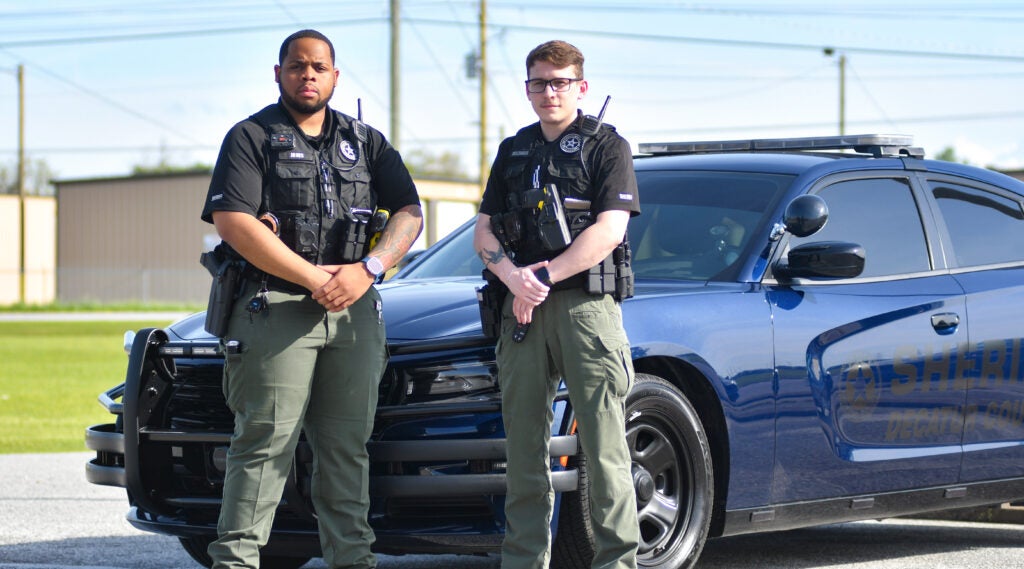Back to life: Decatur County Sheriff’s Deputies Jeremiah Millender & Hunter Jones save woman’s life with no pulse
Published 5:00 pm Friday, March 29, 2024
|
Getting your Trinity Audio player ready...
|
Decatur County Sheriff’s Deputy Jeremiah Millender was on his normal night shift patrol when he was dispatched to a call of an unresponsive woman. He was three minutes from the location of the call and rushed over to the scene.
Another Deputy, Hunter Jones, arrived shortly after followed by EMS and their Sergeant, Edwin Harvey. Millender and Jones sprung to action to save the woman they presumed dead.
After continuous CPR, three shots of Narcan and a dwindling sense of hope, the woman woke up.
“I figured that it was going to probably be fatal after three doses of Narcan and probably like a hundred-and-something [CPR] compressions and she hasn’t responded at all,” Millender said. “If you asked me five seconds before she got up if I thought she was going to make it, I would have said, ‘No.’”
Millender was the first to the scene. He made his way into the home and walked into a woman unconscious in her bed, surrounded by a worried husband and children. The woman did not have a pulse, and the deputy said all signs were pointing to an opioid overdose
He administered a shot of Narcan to the woman in an attempt to bring her back. Narcan is a medicine that rapidly reverses an opioid overdose, according to the National Institute on Drug Abuse. It had no immediate effect, so he moved her from the bed to the floor to begin performing life-saving CPR.
“I thought she was dead before I pulled her off the bed,” Millender said. “That was the first time I’d been to an overdose where we had no pulse for a good portion… You get to a certain point, and your brain doesn’t have oxygen like that, you’re going to end up not coming back.”
Millender performed 60 compressions of CPR, then Deputy Jones arrived on the scene.
When I first walked in,” Jones said, “I noticed the father and [the children], So it raised the situation much higher. Because not only are you trying to save this lady for herself, you’re trying to save her for her family.”
Jones took over for Millender on CPR duties. Sergeant Harvey and EMS arrived shortly after, and an EMT instructed Millender to administer a second shot of Narcan. The second dose gave the woman a faint pulse, but she was still entirely unresponsive.
Jones continued to administer CPR with a newfound encouragement after the faint pulse was detected. After three sets of compressions, the woman was not making any more progress towards beating the overdose.
“That’s when I ran back to my patrol car and went ahead and grabbed my Narcan,” Harvey said.
This was the third dose and was a last-ditch effort to save the woman. Millender said one shot is normally enough to fully combat an overdose.
When Harvey got back to the room, he handed the medication to Jones who administered the final shot.
“They were probably on their last set of compressions before they were going to stop,” Millender said. “I turned around, and she just sat up.”
The woman came out of the overdose in a haze, but she had a pulse and was breathing.
“She took a DEEP breath and she just rolls up and her eyes come open,” Jones said. “It’s kind of like she really came back from the dead.”
Harvey said three doses of Narcan is an anomaly, and the third dose wouldn’t have been administered if the second didn’t make its slight impact.
“I’ve been to two previous overdoses, and when I gave the first Narcan, they popped right up,” Harvey said. “After the second [dose]… that small pulse was the deciding factor. Once we had that little faint pulse, I went ahead and grabbed my third one and gave it to Jones.”
Jones and Millender both cited the incident as one of the more intense calls they’ve responded to as a Sheriff’s deputy. Jones described it as “an eye-opener,” and Millender said the pressure of her children being there added to the moment. Harvey said his deputies responded well and handled the situation in the best way possible.
“They went in there and knew what they had to do,” Harvey said. “Especially when somebody’s not breathing, you can start to panic a little bit, and I didn’t see really any panic. I’m proud of them… they did a really good job of [keeping their composure].”






